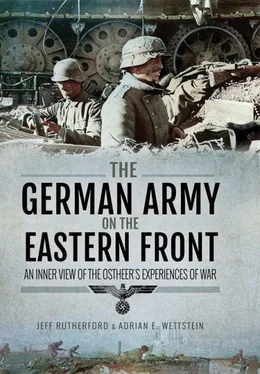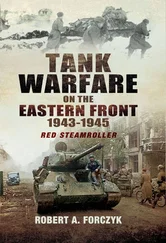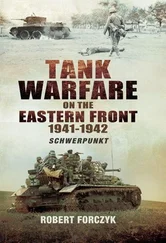A report issued by a regimental commander fighting on the northern section of the front in spring 1942 acknowledged the Red Army’s fighting abilities, but understood these in the larger context of a mixing of Asiatic blood and Bolshevik ideology.
No less than the forces of the area’s geography, the peculiarity and character of the Soviet people have determined the form and development of the fighting in Russia. The Soviet theatre of war differs from all other European theatres in this war in that the enemy fights with almost animal-like doggedness and cruelty and therefore forces every single German soldier to fight to the last and with absolute severity. The legacy of middle-Asian blood [ Bluterbe ] and the Bolshevik teaching of crass materialism, which strips even life as such of its higher worth and sees it as an objective matter, something functional, so that the failure to reach a goal set from the outside … means it has no legitimate reason to exist and merits being wiped out, is reinforced by the political and military leadership of all ranks and is also absorbed in numerous simple soldiers of the Red Army to perfection. We must not forget the spiritual dullness and weak character development of primitive, Russians, made soulless [by the Bolsheviks]. [23]
The Nazi ideological belief system based on both ‘biological’ beliefs and anti-Bolshevism that had framed the invasion with the criminal orders thus continued to provide soldiers with a context to understand their opponent into the second year of war.
The extension of the war into 1942, however, meant that the army now had to take more proactive steps to ensure that its soldiers remained functional in the field. Complementing tangible attempts to keep the men well supplied with appropriate clothing, modern weapons, and sufficient food, it also tried to maintain the men’s spirits. While the army’s use of Nazi ideological beliefs to steel the minds of its men became increasingly prevalent during the second half of the war, this proved to be only one means of providing spiritual and physical care for the ranks. One concrete manifestation of this policy was the establishment of the Erholungsheim , or recuperation centre, for troops who required some rest from the strains of battle. The 205th Infantry Division’s guidelines for its recuperation centre were as follows: [24]
Purpose : Front soldiers (officers, NCOs and rank and file) shall recuperate in that home in the first place physically through sufficient sleep, good nourishment, [and] personal hygiene (including delousing). The get-together with other comrades shall serve the fostering of comradeship and the understanding of other branches, a proper spiritual care (reading, music playing, visits to the cinema, etc.) for mental strengthening and refreshment. […]
Recuperation time: Four days; in addition to the day of arrival (arrival from 15.00) and the day of returning (departure before 08.00). Recuperation time will not be charged to the home leave due.”
[The home has places for 10 officers and 48 NCOs and soldiers.]
Care: One female head and two female assistants of the German Red Cross.
The 7th Infantry Division also established such a recuperative area for its troops in February 1942. [25]
The division clearly understands that only the smallest gaps can be filled with the replacements that have arrived. Nevertheless, the combat strength reached in this way allows for small recuperation centres to be established at the regimental and independent battalion levels.
Purpose of the recuperation centre:
a) De-lousing of the soldiers with the simplest means
b) Rest for the soldiers for a few days (2–3 days) with better food
c) New uniforms. The present clothing situation is not unfavourable to this end.
The soldiers in the trenches are primarily to be considered for these measures, and within a specific period of time, they will be given opportunity to clean themselves up and to relax, even if only for a few days.
Guidelines for the installation of de-lousing devices have been given.
To save time, the recuperation homes are to be established by the regiments and independent battalions within the accommodations area eastwards of the north-south road. An appropriate spiritual care is to be aimed for in the recuperation centres. (Radio, newspapers, card games, skis, etc.)…
The 8th Panzer Division sent five of its men to the Erholungsheim in Skugry in late October 1942 with high hopes for their recuperation: [26]
Thanks to its ideal location, the excellent food and the provided spiritual care, the stay in Skurgy invariably has a lasting effect in a physical and spiritual respect on the troops who are sent there.
The events of late 1942 and early 1943, however, clearly signified a shift in the initiative. The combination of battlefield defeats – notably the destruction of the Sixth Army in Stalingrad – with the increasing number of casualties, especially of officers and NCOs, meant the army as a whole experienced a ‘leadership and confidence crisis.’ [27]With victory no longer assured and Hitler’s direction of the war no longer seeming infallible, morale plummeted throughout the Eastern Army. [28]The 126th Infantry Division’s commander attempted to provide spiritual succour for his hard-pressed men defending along the Volkhov River in northwest Russia. [29]
Soldiers and comrades of the 126th Infantry Division!
On 30 January 1943, it is 10 years since our Führer was called to the summit of the government by the immortal Reich President, Field Marshal von Hindenburg. At that time, the formerly powerful German Reich found itself in abject humiliation, because the world powers England, France and North America tolerated no new ascent of our Fatherland and had bartered away old German land on our borders to small robber-states, such as Poland, Belgium, Denmark, Lithuania, and Czechoslovakia. Our agriculture, industry, shipping, aviation and trade could therefore not develop. Unemployment and hunger were the result. What has since changed in these 10 years? The Führer has created one, unified German Volk that is governed on a social basis and whose work is defended by powerful and strong armed forces. There is no longer any unemployment and no hunger. No German needs to emigrate to foreign lands in order to find his bread. The Saar, the Rhineland, German-Austria, and the Sudetenland returned to the Reich. Now England and France declared war against us, in order to crush us with force.
So came the Second World War, that now rages in its fourth year of war and which is a war of to be or not to be. Tremendous victories have been achieved; Poland, France and Yugoslavia were crushed and the landing attempts of the English in Norway and Greece were bloodily smashed. As soon as our victory appeared certain, the enemy, international Jewry, threw the war machines of Bolshevism and North America into the fight. The mighty Japan entered on our side. The Russians and Americans were forced to swallow heavy defeats in Europe and East Asia, but the fight is still not ended. The enemy also knows that everything depends on the outcome of this war. And so it is now that the great final battle has flared-up in which we, as well as our enemies, are committing our last reserves to achieve victory. We also know what it is for and therefore grit our teeth. The more the enemy attacks, the more we need to strike back. The lord of battles will only give the laurels of victory to the most courageous Volk .
Our Führer has in a previous winter, when it was also either do or die, taken over command of the army himself and we have endured. We will also endure now despite a few setbacks, because we are the better soldiers. We receive the better weapons and are better supplied and clothed than our enemies. Fighting with us are our U-Boats on the seas and our air fleets in the skies. Our allies Italy, Romania, Hungary, Finland and the powerful Japan faithfully stand with Germany. We have the previously conquered countries in Europe firmly in our control and again liberated the old German lands on our borders. When we win, Germany will head towards a radiant future. We want to protect our beautiful Heimat from Bolshevism; we want to maintain our beautiful houses and gardens, our green forests and meadows for us.
Читать дальше






![John Stieber - Against the Odds - Survival on the Russian Front 1944-1945 [2nd Edition]](/books/405234/john-stieber-against-the-odds-survival-on-the-russian-front-1944-1945-2nd-edition-thumb.webp)





